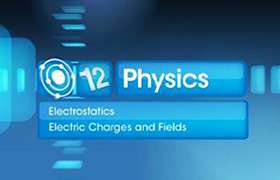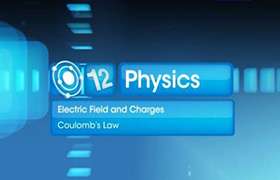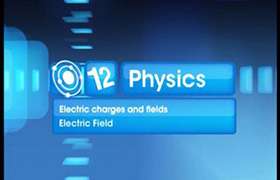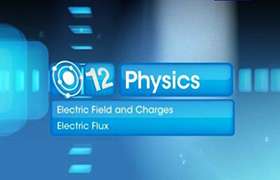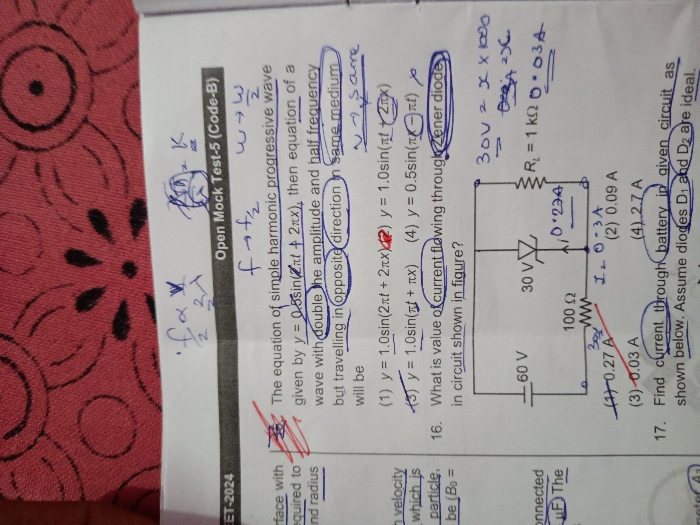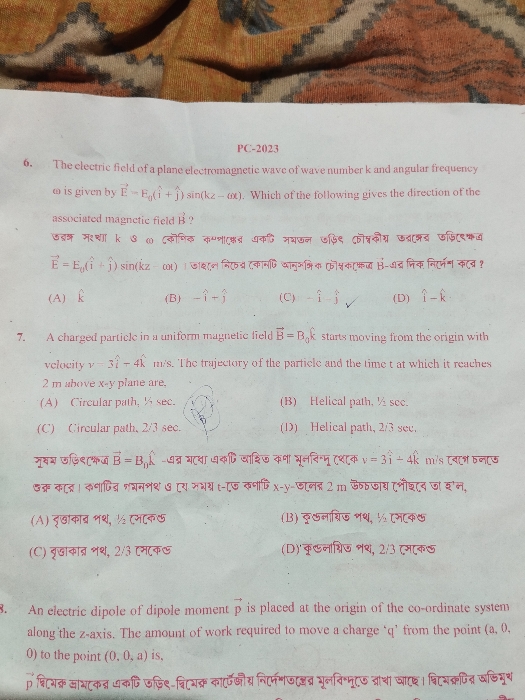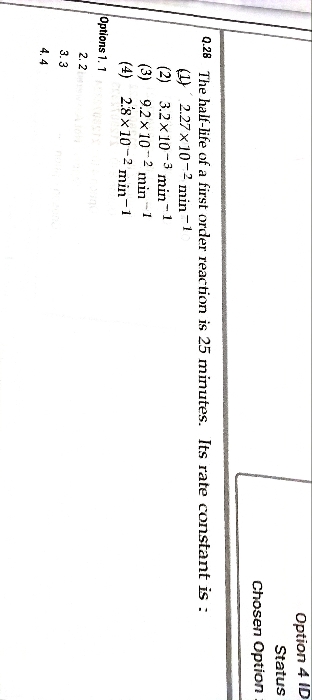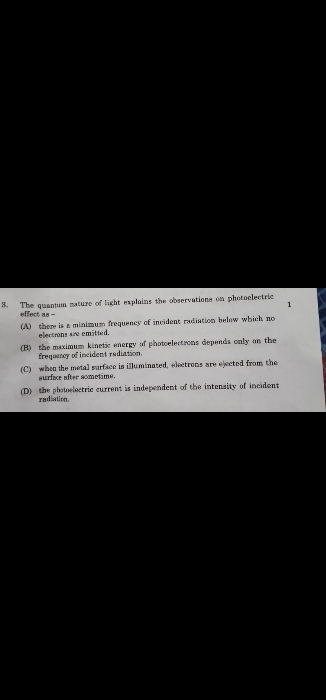CBSE Class 12-science Answered
Find the equivalent capacitance for a,b,c,d without star Delta conversion.
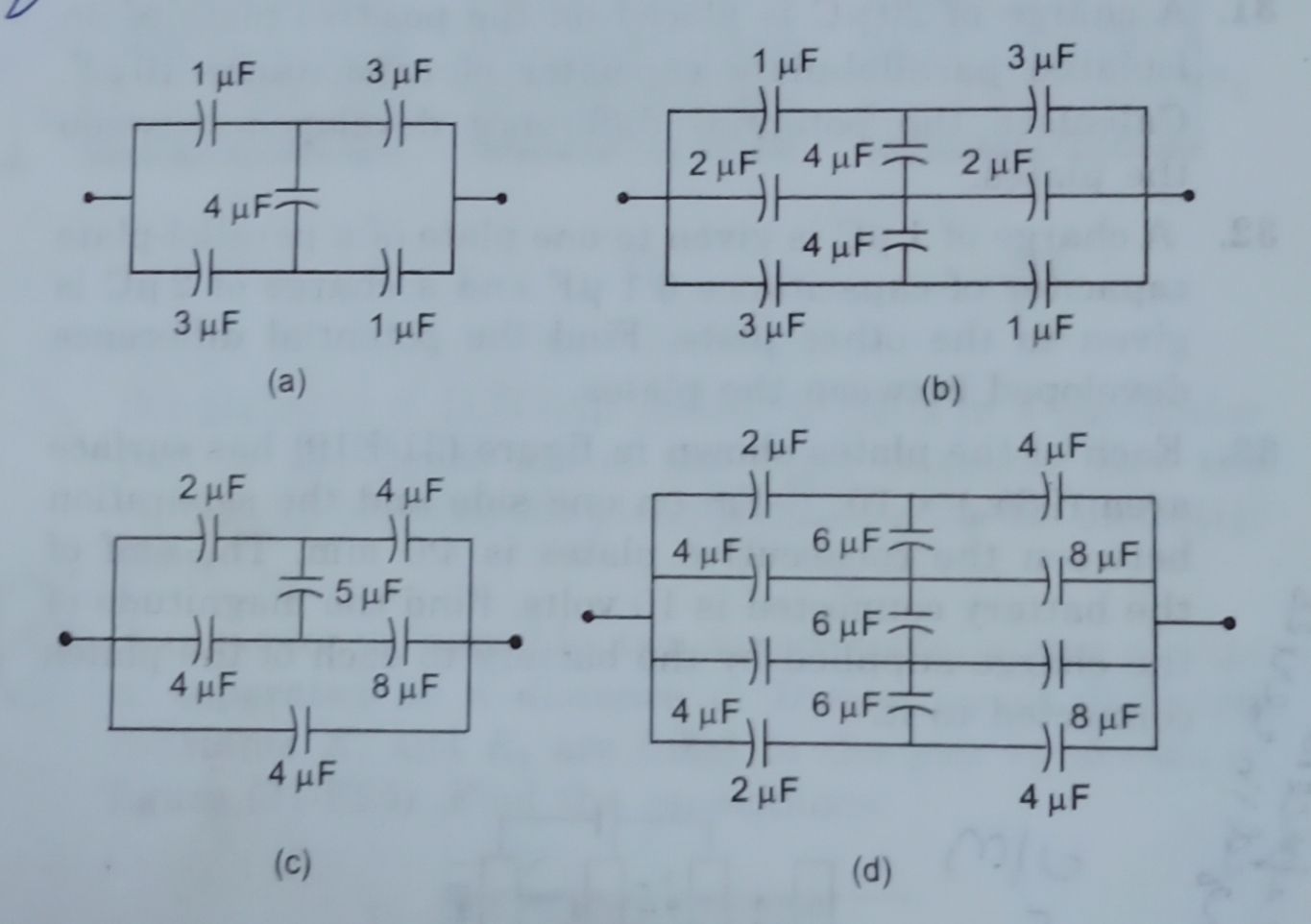
Asked by prakriti12oct | 01 Aug, 2019, 12:27: AM
(a) 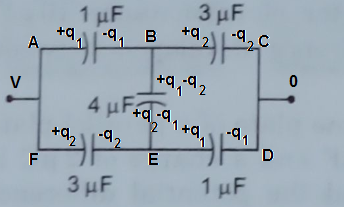

Let us apply a potential difference V across the given network of capacitors.
Let q1 be the charge on 1μf capacitor between A and B. Let q2 be the charge on 3μf capacitor between B and C.
By symmetry, we put similar charges across 3 μf and 1 μf capacitors in the line F-E-D.
Isolated plates of 4μf capacitors will get the charge q2-q1 as per Kirchoff's junction rule
Since we have potential difference V across A and C, we get, (q1/1) + (q2 / 3) = V or 3 q1 + q2 = 3 V ...................(1)
By applying Kirchoff's rule for the loop A-B-E-F, we get,
(-q1 / 1) + ( q2 - q1)/4 + q2/3 = 0 or (-5/4)q1 + (7/12) q2 = 0 ....................(2)
By solving eqn.(1) and (2), we get, q1 = (7/12) V and q2 = (5/4)V
Total charge Q drawn from the potential difference by the capacitor network is given by,
Q = q1 + q2 = [ (7/12) + (5/4) ] V = (11/6) V
effective capacitance = Q/V = (11/6) μf
-----------------------------------------------------------------------------------------------------------------------
(b)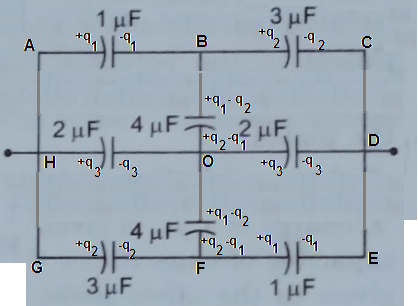

Let us apply a potential difference across the given network of capacitors as shown in figure.
Let q1 be the charge across 1 μf capacitor between A and B . Let q2 be the charge on 3 μf capacitor .
By symmetry, 3 μf and 1 μf capacitors will have similar charges in the line G-F-E .
Let q3 be the charge on capacitors of equal capcitance 2 μf in the line H-O-D.
4μf capacitors will get the charge q2-q1 as per the kirchoff's junction rule.
Since we have potential difference across points A and C, we get , ( q1/1 ) + (q3 / 3 ) = V or 3 q1 + q3 = 3 V ...................(1)
For the points between H and D, we get, ( q3/2 ) + (q3/2 ) = V or q3 = V .........................(2)
By applying Kirchoff's rule in the loop A-B-O-H, we get, ( -q1/1 ) + ( q2-q1)/4 +q3/2 = 0 or -5q1 +q2 +2q3 = 0 ....................(3)
By solving eqn.(1), (2) and (3) , we get q1 = (5/8) V , q2 = (9/8)V , q3 = V
Net charge Q drawn by network, Q = q1 + q2 + q3 = [ (5/8) + (9/8) + 1 ]V = (11/4) V
Hence effective capacitance, Q/V = (11/4) μf
--------------------------------------------------------------------------------------------------------
(c)

Capacitance ratio in the line A-B-C and in the line D-E-F are same [ ( 2/4 ) = (4/8) = 1/2 ].
Hence points B and E will be at same potential and 5μf capacitor will not be chareged and
can be removed from network as shown in step-1.
Equivalent capacitance of series combination in the line A-B-C is (4/3)μf .
Equivalent capacitance of series combination in the line D-E-F is (8/3)μf .
Hence as shown by step-2, effectively we have 3 capacitance in parallel
Effective capacitance is [ (4/3) + (8/3) + 4 ] μf = 8 μf
----------------------------------------------------------------------------------------
(d) 

Capacitance value in the line G-H-I is not given in the question.
By symmetry , they are assumed as 2μf and 4μf as shown in figure
In the given network, capacitance ratio in each of the lines A-B-C , D-E-F, G-H-I and J-K-L is 1/2.
Hence points, B, E, H and K have same potential.
Capacitors connected between these equi-potential will not be charged and can be removed from the network.
Hence as given in simplified network, we have four parallel lines of series-connected capacitors.
Hence effective capacitance can be worked out as, [ (4/3)+(8/3)+(4/3)+(8/3) ] μf = 8 μf
Answered by Thiyagarajan K | 01 Aug, 2019, 10:43: PM
Concept Videos
CBSE 12-science - Physics
Asked by niharvijayvargiya5 | 23 Apr, 2024, 06:40: PM
CBSE 12-science - Physics
Asked by kulhariabhijeet | 21 Apr, 2024, 02:39: PM
CBSE 12-science - Physics
Asked by mohapatraswetalina88 | 21 Apr, 2024, 12:18: PM
CBSE 12-science - Physics
Asked by aishaisha091098 | 19 Apr, 2024, 04:54: PM
CBSE 12-science - Physics
Asked by dasrituparna1999 | 13 Apr, 2024, 06:56: AM
CBSE 12-science - Physics
Asked by dasrituparna1999 | 12 Apr, 2024, 09:26: PM
CBSE 12-science - Physics
Asked by mishrigupta19319 | 08 Apr, 2024, 06:28: PM
CBSE 12-science - Physics
Asked by madhav9119887644 | 07 Apr, 2024, 08:10: PM
CBSE 12-science - Physics
Asked by mishrigupta19319 | 07 Apr, 2024, 11:23: AM

